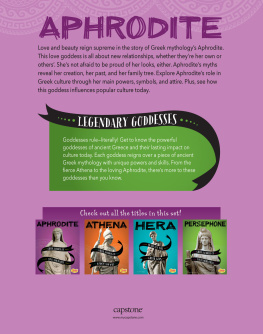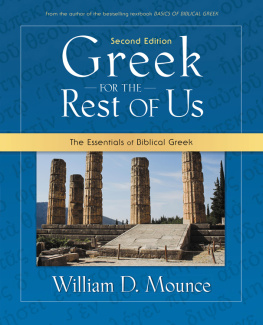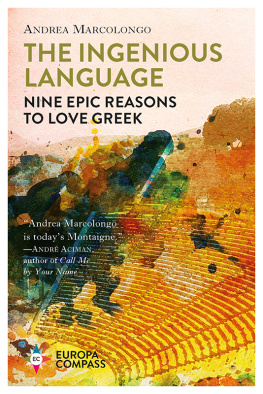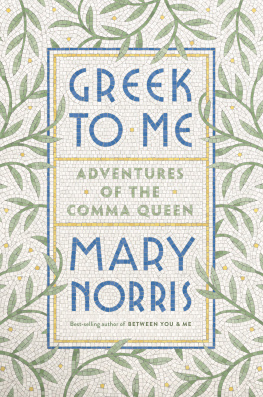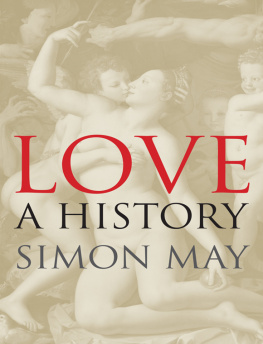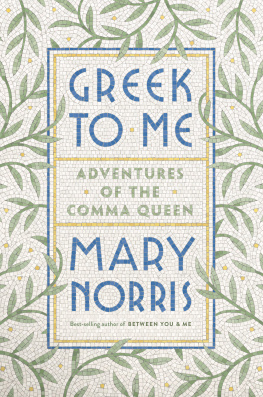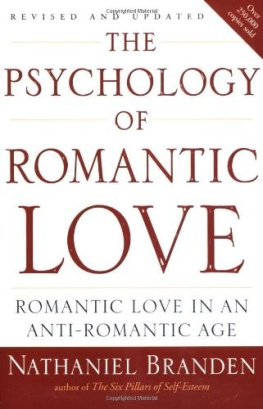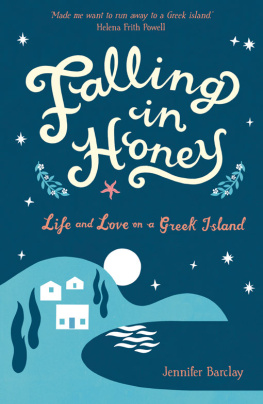Acknowledgments
The publisher is grateful for permission to quote selected extracts from the following:
Sept, 1, 1930, by W. H. Auden; Random House, Inc.
Crazy Jane Speaks to the Bishop, in Collected Poems, by William Butler Yeats; Macmillan Co.
Delinquent Boys, by Albert K. Cohen; Free Press of Glencoe
The True Believer, by Eric Hoffer; Harper & Brothers
The Wandering Scholars, by Helen Jane Waddell; Constable & Co., Ltd.
The Last of the Wine, by Mary Renault; Longmans Green & Co., Ltd.
The Odes and Epodes of Horace, translated by J. P. Clancy; University of Chicago Press
Homosexuality and the Western Christian Tradition, by Canon D. S. Bailey; Longmans Green, & Co., Ltd.
Michelangelos Complete Poems, translated by Joseph Tusiani; Noonday Press
This edition copyright Neville Spearman Ltd. 1971
First published in Great Britain by
Neville Spearman Publishers
112 Whitfield Street,
London W1P6DP
ISBN 85435 450 6
Reproduced and Printed in Great Britain by Redwood Press Limited, Trowbridge & London, using paper supplied by Frank Grunfeld Ltd., London. Bound by W & J Rawlinson Ltd., London.
The numbers in curly brackets are the page numbers of the original printed book (1971).
To my beloved wife
and to all
who have befriended
boys in need.
Preface to the British Edition
Since the original edition (1964) of Greek Love, many social changes have ensued, some in part evidently stimulated by ideas already in the air and reflected in the book. {ix} Haight-Ashbury came and went, with its brave though hopelessly unrealistic ideal of a New Community based on brotherly love independent of age or gender. Four separate publishing houses in the USA I cannot speak for the UK or other nations were set up, devoted primarily to elaborate art books featuring the beauty of boys; each produced one or more splendid volumes, only to go bankrupt, the last after issuing a valuable sociological study of boy prostitution (Boys For Sale, Three Acres Press, 1969). Numerous underground publishers in many parts of the USA began issuing slides, transparencies, sets of prints, and even quasi magazines (of frankly pornographic intent) on similar themes. From one of these recently appeared a sociological study of alleged Greek lovers, The Boy Lovers, ed. Dennis Harmon, Jumeaux Press, 1969; it is naturally heavy on the sex play but does give some sociological details though they have to be searched out among the erotic passages. There have been at least two partial plagiarisms of Greek Love in soft covers.
In 1965 the US Supreme Court, in the Mishkin case, excluded certain materials aimed at sexual minorities from Constitutional protection, opening them to Federal and State prosecution. Despite this decision, publications for boy-lovers mostly frank ephemera have proliferated during the last five years. Our own International Journal of Greek Love (two issues in 1966) attempted to reach a more idealistic and scholarly audience, but between the editors prolonged illness in 19667, and the publishers still longer absence from the USA, no more has come of the venture to date. {x}
Androphile homosexuality first, and then boy-love itself, became a surprisingly common theme of Hollywood films, after the acceptance of various foreign films on these latitudes of love had established that a market existed. A few of these films were surprisingly overt, both in depicting love situations where man and boy spoke frankly to each other, and in displaying male nudity; this is entirely apart from the marginal films aimed entirely at a tiny coterie of homosexual theatres, having no appeal to other audiences.
In the light of these social changes, and in particular in the context of a growing attention to both androphilia and boy-love as potentially or actually legitimate, the time seems ripe for republication, with corrections, of the original text which set forth for the first time in print many of the radical propositions of love and let love.
Corrections in the present edition are based in part on subsequent researches by the writer, and in part also on those of Dr. Warren Johansson, many of the latter being embodied in the German translation, Griechische Liebe, Hamburg, Kala Verlag, 1967, beautifully translated by Albert Y. Millrath.
However, a basic rethinking has become necessary for some issues only incompletely covered, a rethinking based partly on followups of several of the case histories, partly on social changes since 1964, partly on a miscellany of other factors; and there is no way it could be inserted into the original text without extensive rewriting. What stimulated it was the mail received at Oliver Layton Press during the eighteen months or so following appearance of the first and second American printings of Greek Love, and in connection also with the Journal.
I had originally aimed the book at scholars, social workers, psychotherapists, ministers, parents and others having a professional or idealistic or at least open-minded attitude to the phenomenon. So far from being the polemic it seemed to many, Greek Love attempted to be an interdisciplinary depth study of a single important issue in the history of ideas; a study which of necessity could not be cast into a pose of specious objectivity masking rationalizations of prior objections; a study which thus had to present pro and con, objection and reply, and let the arguments develop as they would, in search of the truth. What too many read into the book was, instead, a rationalization of their own aberrations. Some wished me to write at length preferably book length, complete with case histories full of erotic detail of father-son incest. Others complained that I had failed to give arguments in favor of picking up prepuberal boys for casual sex. Replies in the Journal to the effect that the books theme was {xi} one of the varieties of love, not prostitution and not casual sex, were to no avail. I finally concluded that professed idealists were rarer even than scholars in this line, rarer still compared to those who express themselves in the manner of Roman cynics of the persuasion of Horace or Martial.
The basic issue slurred over by these readers appears to have been the question of consent. How young can a boy be to give a meaningful consent to a sexual proposition whether or not it is part of an ongoing deep relationship? Or, conversely, does an age exist below which a boy would be bewildered, put off, frightened, or emotionally damaged by the potential introduction of sex into a friendship with someone older enough to be (under other circumstances) a possible authority figure? What effects have such incidents on boys psychosexual development, attitude to love (heterosexual or otherwise) in later life, attitude to the older generation as a whole?
The frequent claim evidently in many cases entirely factual that the sexual phase of a man-boy friendship was initiated by the boy, likewise, has sometimes apparently been used as a way of disclaiming responsibility on the mans part. Is this a rare or common consequence in such affairs? How can one know if a boy is really aware of what he is starting? What effect on his later life can be anticipated from such an episode? And is it safe to assume that his lover is an idealist rather than a casual exploiter?
With the much younger ones, there is also a question of comparative size. Will their own comparatively small immature genital development become a source of dissatisfaction and ego damage?
All these questions require answers, and to date nobody has begun the immense research projects which might lead to reasonable answers neither the entirely hopeful ones sought or guessed by boy-lovers (when they think of such issues at all) nor the horror-stricken ones automatically assumed by the rigidly conservative faction.


